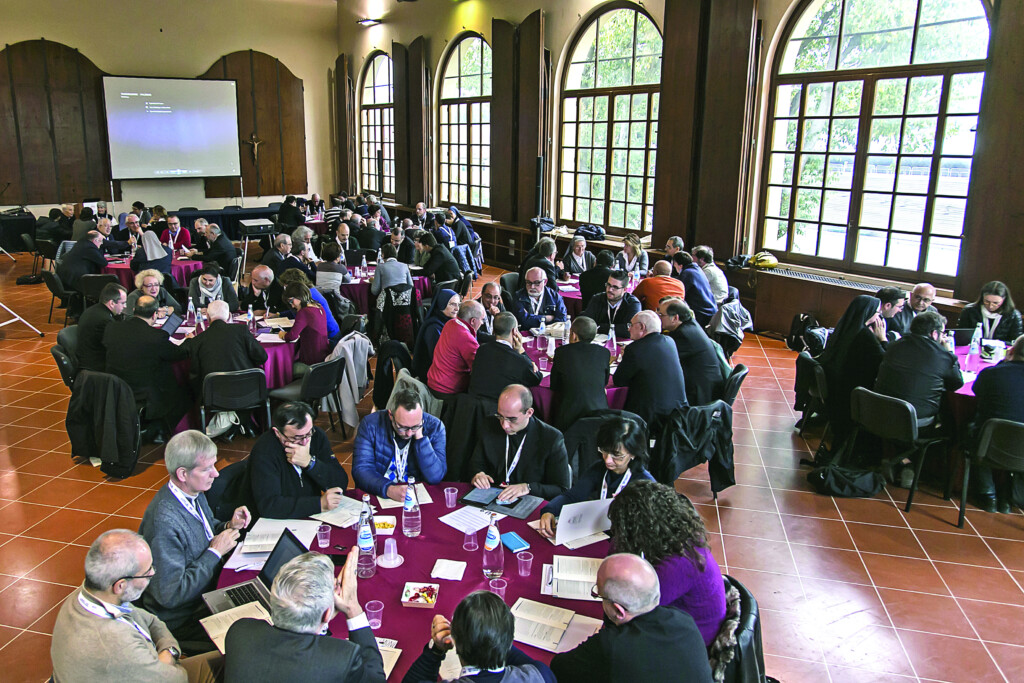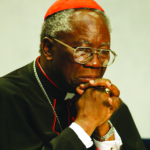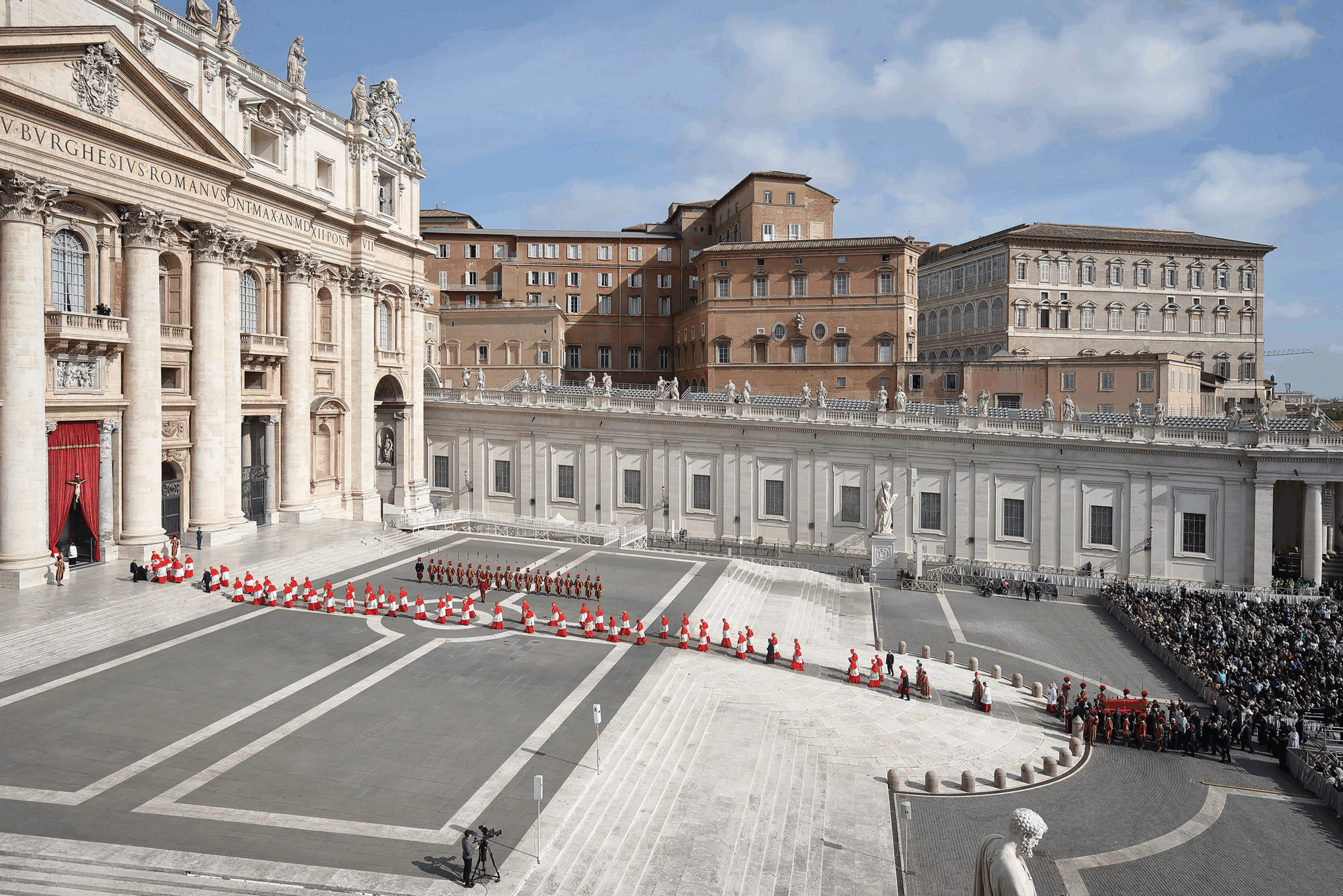But should its results thus far give the Holy See pause?
By Christina Deardurff

On October 16, during his Sunday Angelus, Pope Francis, in a surprise decision, announced that the scheduled 2023 Synod on Synodality would be extended for an additional year. The Synod will thus begin in Rome in October 2023, but then continue for an additional year of reflection and conclude only with another-month-long session in October of 2024.
The announcement came as the Vatican’s second phase of preparations for the 2023 Synod seemed to be ending, as the last episcopal conferences from around the world submit the results of their “listening sessions” conducted with their responding faithful. The next stage is the “Continental Stage” — meetings of regional episcopal federations, intended to, according to the Vatican, “deepen our discernment of what has emerged from the previous phases of local and national listening.”
A few themes seem to be recurring, especially among those of the “developed” world, and virtually all of them have to do with sex and gender: more ecclesial “power” for women, an end to priestly celibacy, official approval of homosexuality, recognition of transgenderism, and acceptance of artificial contraception. On the heels of these themes are calls for a general empowerment of the laity, in tandem with the eradication of “clericalism,” often cited as the root cause of clergy sexual abuse.
Why is sexuality and its attendant phenomenon, gender, of such prime importance to those offering their opinions about today’s Catholic Church? The most obvious answer is that these are the themes preoccupying the world — at least the western, and westernized, cultures where the influence of the internet is pervasive. These are the themes vying for people’s attention every day, and other themes like the salvation of one’s soul, combatting the effects of sin, the increase of sanctifying grace among the faithful and spreading it to the entire world — themes that once were assumed to be the special province of the Catholic Church — seem, if the “listening sessions’” responses are accurate, to be absent from the average Catholic’s radar. (Of course, this is a gross generalization: the African churches, for example, do not seem to share the enthusiasm of the more developed nations for embracing modern sexual mores.) So, does this preoccupation with sex really reflect what is in the minds and hearts of average Catholics? And is it a good thing for the Church?
Darrick Taylor, American Catholic commentator and history professor, doubts the former. Commenting recently on the Synodal “synthesis” document produced by the U.S. bishops, he noted: “Combing through a document rife with clichés drawn from the language of secular politics and psychology — bromides warning of ‘polarization,’ the need for ‘dialogue,’ and the importance of ‘lived experience’ — followed by completely unironic assertions about ‘clear, concise, and consistent communication as key to the strong desire for appropriate transparency,’ is enough to erode one’s confidence in the ability of the language to convey meaning. […] There is something larger at work here in the synthesis and the whole Synod itself. Perhaps you have seen the pictures of the ‘synodal experts’ in Rome floating around the internet. They witness to the generational divide in the Church between an aging, ‘progressive’ Church officialdom and its younger, more conservative seminarians, priests, and laity. The ‘synodal process’ is a celebration for the former, one last chance to remake the Church in their own, graying image. The U.S. synthesis admits as much toward the end of the document: ‘Through participation in the diocesan phase of the Synod, the People of God have already begun to build the Church for which they hope.’” (See Crisis magazine.com)
The participation rate of the U.S. laity in the “listening sessions” was in fact a dismal 1% (although higher than in many other countries) — so the numbers themselves cast into doubt that the document accurately represents the laity at large.
But even if we were to concede that the concerns expressed in the synthesis represent most Catholics’ views, what happens when the Church turns toward the cultural legacy of the Sexual Revolution as a guiding star?

One thing that happens is that people come to resent the Church’s unchangeable moral teachings and its presumption of competence to present them. According to a USCCB synthesis document, “The synodal consultations mentioned several areas where there existed a tension between how to walk with people while remaining faithful to the teachings of the Church: ‘for many, the perception is that the blanket application of rules and policies is used as a means of wielding power or acting as a gatekeeper.’ As one synodal consultation described, ‘People noted that the Church seems to prioritize doctrine over people, rules and regulations over lived reality.’”
Apparently, Catholics do not seem to have any understanding of what moral doctrine is and how, because it is an expression of God’s design for man, in accordance with the nature He gave us, it actually fosters, rather than hinders, human happiness and flourishing.
And there is no area of Catholic moral teaching that is more contested than sexuality. This is not surprising, because sexuality is the one moral area in which western (and formerly Christian) culture has done an almost complete about-face in the past several decades.
And a Catholic populace which has been indifferently, if not poorly, catechized seems unable to resist the tide of sexuality virtually unmoored from morality (“consent” being the last, feeble shred of any moral scruple in contemporary sexual attitudes).
Thus the “Catholic” pro-homosexuality organization New Ways Ministries gleefully lists on its website a number of national Synodal “listening session” reports which include calls for “welcoming” and “inclusion” of “LGBT+ persons” as well as co-habitating couples, samesex couples and those divorced and remarried outside the Church.
The Archdiocese of Luxembourg, it notes, “issued a 16-page report drawn from nearly 4,600 respondents which, among other calls for reform, seeks a change in Church teaching on homosexuality carried out by the universal Church. Notably, the archdiocese’s head, Cardinal Jean-Claude Hollerich, withdrew from the process because of his role as the upcoming synod’s relator general — though he has spoken previously in support of developing the Church’s sexuality teachings.”
In Switzerland, the Synodal process has yielded the judgment of the synthesis that Church teachings on gender and sexuality are “perceived as derogatory and exclusionary,” and there is a call for a reevaluation of such teachings in “synodal dialogue with the experiences of the people and in reception of scientific and empirical research.”
The report from Australia said, “In some instances, the Church was seen as placing barriers of exclusion by its teachings and the application of those teachings…”
Since the words “inclusion” and “welcoming” often appear in tandem with references to the need to “develop” and, less ambiguously, “change” Church doctrine, it becomes clear that the thrust of the overall Synodal reports delivered to the Vatican will be, at least from the West, heavily biased toward urging the official embrace of secular sexual norms.
Never mind that by virtually every metric of wellbeing, those who embrace these secular norms in their lives fall short of those who strive to live according to Catholic teaching, with higher rates of depression, loneliness, anxiety, suicide, abortion, divorce, negative health outcomes, and below-average life spans.
At root is the question of how those in positions of authority in the Church understand the Church herself. Is the Church, although populated by very imperfect, sinful people, still tasked by her Founder and Head to teach the unchanging truth of sin and redemption for the salvation of every human being? Is the Church competent to do this, or not?
Back in 1974, in two astonishing speeches of September 11 and 18, Pope Paul VI lamented that the Church had seemed to be losing her own self-understanding, as Romano Amerio noted in his 1996 book Iota Unum: “The Pope (Paul VI) wonders whether the world still needs the Church to teach the values of charity, respect for rights, or solidarity, given that, ‘the world does all this, and it would seem, does it better’ and that its success in doing so seems to justify the abandonment of religious practice by whole peoples, the irreligiousness of secularism, emancipation from the moral law, the defection of priests and also of ‘the faithful who are no longer worried about being unfaithful.’ In short the Pope puts forward the idea that Christianity is superfluous, and that the modern world could be emptied of all religion: one might call it the advent of ‘man the minigod.’”
Indeed, the view Amerio lamented in 1974 has turned out to be the view of the Church held today by a significant portion of even her clergy. A recent commentary on the priesthood in Settimana News, published by the Priests of the Sacred Heart of Jesus in Bologna, Italy, for example, explains, “The task of the minister is to train the Christian to take a position on the problems of the world with the power of the Gospel: Christians who are influential in their own sphere of life, not because they are zealous repeaters of the sermon they have heard in the church, but because they are capable of serious and pertinent pronouncements on problems that arise in society.”
There is nary a word about the power of the sacraments, of sanctifying grace, of prayer, or even the need for these things; Christians are apparently self-sufficient to accomplish their own salvation and the purpose of the Church is actually to lend its weight to movements for peace, for the environment, for human rights, etc.
But the fact is, the Church is not really necessary for any of these things; hence, this view, as Pope Paul observed, renders the Church disposable.
We can only pray that the Synod on Synodality does not prove to be the self-inflicted blow to the Church that its preparation augurs.
Cardinal Arinze’s Key Sept. 24th Statement on Same-sex Blessings
 It is reported that Flemish Bishops in Belgium, on or around 20 September, 2022, published what they called a liturgical blessing for homosexual couples. They, it is said, regarded this step as “being pastorally close to homosexual persons, for a welcoming Church that excluded no one.”
It is reported that Flemish Bishops in Belgium, on or around 20 September, 2022, published what they called a liturgical blessing for homosexual couples. They, it is said, regarded this step as “being pastorally close to homosexual persons, for a welcoming Church that excluded no one.”
Even if the aim is to be pastorally helpful to homosexual couples, this is an error on the part of the Bishops. Holy Scripture presents homosexual acts as acts of grave depravity (cf. Gen 19:1-29; Rom 1:24-27; 1 Cor 6:10; 1 Tim 1:10). Tradition, says The Catechism of the Catholic Church, n. 2357, “has always declared that homosexual acts are intrinsically disordered.”
While persons with homosexual inclinations are to be respected and not unjustly discriminated against, they, like every Christian and indeed every human being, are called to chastity (cf CCC, 2358, 2359). The Lord Jesus said to his followers: “You, therefore, must be perfect, as your heavenly Father is perfect” (Mt 5:48). That is why the CCC says: “Homosexual persons are called to chastity. By the virtues of self-mastery that teach them inner freedom, at times by the support of disinterested friendship, by prayer and sacramental grace, they can and should gradually and resolutely approach Christian perfection” (CCC, 2359).
This explains why the Congregation for the Doctrine of the Faith on 15 March 2021 answered that the Church does not have the power to give a blessing to unions of persons of the same sex.
This is what the Flemish Bishops, and indeed all Bishops and priests, should be teaching. They should be blessing, not homosexual couples, but properly married unions of one man and one woman. Human beings have no power to change the order established by God the Creator. The Church is sent by Christ to all people “teaching them to observe all that I have commanded you” (Mt 28:20). This includes calling people to repentance, sacrifice, chastity and perfection. —Francis Cardinal Arinze






Facebook Comments